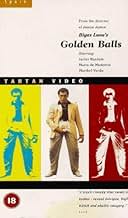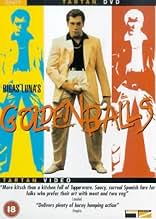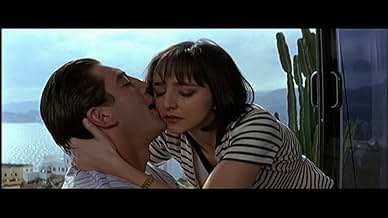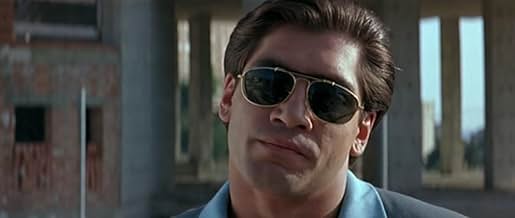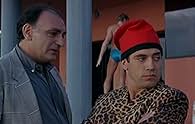Un trabajador de construcción usa su encanto en un intento de obtener suficiente dinero para construir el proyecto de sus sueños.Un trabajador de construcción usa su encanto en un intento de obtener suficiente dinero para construir el proyecto de sus sueños.Un trabajador de construcción usa su encanto en un intento de obtener suficiente dinero para construir el proyecto de sus sueños.
- Premios
- 4 premios ganados y 3 nominaciones en total
Alessandro Gassmann
- El amigo de Melilla
- (as Alessandro Gassman)
Benicio Del Toro
- El amigo de Miami
- (as Benisio Del Toro)
Francesco Maria Dominedò
- El Mosca
- (as Francesco Mª Dominedo)
Francisco Casares
- El productor
- (as Paco Casares)
- Dirección
- Guionistas
- Todo el elenco y el equipo
- Producción, taquilla y más en IMDbPro
Opiniones destacadas
This is a generally enjoyable send-up of the excesses of the 1980's:- the get-rich quick, looking after no. 1 culture which prevailed for a mercifully brief period. The anti-hero is a cynical building contractor who will do anything to achieve his aim of making a fortune out of nothing, regardless of the law or of any loyalty to those closest to him. Needless to say, he gets his come-uppance and the final scene in which he smashes a lavatory to pieces is vintage Bigas Luna.
Unfortunately, it doesn't quite manage to keep up the same pace as "Jamon Jamon" and, particularly after about half way through, it starts to lose its momentum and the viewer starts to lose interest. But there are one or two scenes which are so funny that they alone make the film worth seeing, e.g. the three-in-a-bed scene in which he suddenly realises that he is not the fantastic lover he had always imagined he was.
Unfortunately, it doesn't quite manage to keep up the same pace as "Jamon Jamon" and, particularly after about half way through, it starts to lose its momentum and the viewer starts to lose interest. But there are one or two scenes which are so funny that they alone make the film worth seeing, e.g. the three-in-a-bed scene in which he suddenly realises that he is not the fantastic lover he had always imagined he was.
Lots of rather drrunken partying and explicit sexual activity do not disguise the fact that Golden Balls tells a sad story. Bardem, as Benito the young construction worker consumed with ambitions, aspiration, and sexual desire, is very fine. I would give him most of the credit for making this an interesting film, but Bigas Luna, the director, shows great skill in his handling of Benito's tangled relationships with three women and his slick maneuvering to gain financing for his consuming desire to build the tallest skyscraper in the city. Benito scores success in business and with his women, but in the end meets his downfall, losing money and prestige as his shoddy building practices are exposed. Even worse, it is made clear to him that he is not as good in bed as his gardener, Bob, played by Benicio del Toro in what is little more than a cameo but very convincing.
Bigas Luna's film is far from perfect, but I found it a sharp and caustic portrait of a particular lifestyle and a particular time and place in recent Spanish history - the 80's construction boom, the new rich and their unabashed cheesiness, the macho ibérico...Bardem's character is spot on, and he plays the role incredibly well. In fact, all of the performances are very good; it is the directing that occasionally fails the story. It does at times feel like the sex scenes outweigh all others, but I don't feel that they are gratuitous. Other than expensive accessories and a lust for skyscrapers, it is what Bardem's character spends most of his time and energy on. Maria de Medeiros and Maribel Verdú are excellent, especially the latter, who delivers a pretty brave performance. The cinematography is really beautiful and well conceived for each stage of the story. And it contains what must be one of my favorite cinematic moments in a long time...Bardem doing a Julio Iglesias karaoke number in a leopard-print robe, black speedo and Catalan barretina.
With some films it is really hard to tell for whom they were made. Huevos de oro seems to aim at the well educated Spanish middle class. There must be many inside jokes in this movie which you will not understand if you are an outsider. This can be pretty annoying.
Symbols and references to art and popular culture abound, the movie alludes to the work of Salvador Dalí, Luis Buñuel and the Surrealists in general, a certain infatuation with bidet baths seems to point to Duchamp's ready mades. What's more, the main character has also a knack for karaoke tapes with songs of Julio Iglesias. But why all this is mixed together in a rather pretty but also gratuitous way simply eludes me. I can only guess that it all serves to highlight the vital, impetuous, boorish vulgarity of the main character who the director seems to admire and despise at the same time. How all the really pretty women run after him (the main character, I mean) is slightly disconcerting.
The movie has three parts. It starts in the Spanish enclave of Melilla in Africa, where Benito, the main character, does his military service, apparently in the corps of engineers. Then it moves on to the resort town of Benidorm in Spanin where Benito just wants to build the highest skyscraper of the place and become a vulgarized Howard Roark. For the last part a defeated Benito moves to Miami, Florida, presumably in order to start a new life". But the change of places is not really explained satisfactorily. It is also somehow irritating that there is no character development and that the movie descends into a soap opera modus without being convincingly ironic. It must be said that Javier Bardem acquits himself very well playing the young stud who grows limp and deflated.
I purchased this movie because I am interested in townscapes. And Benidorm is a kind of a special place, townscapewise. In this aspect Huevos de oro satisfied me only partially. In Jess Franco's She Killed In Ecstasy (1970) this specific location was used in a more rewarding way.
Symbols and references to art and popular culture abound, the movie alludes to the work of Salvador Dalí, Luis Buñuel and the Surrealists in general, a certain infatuation with bidet baths seems to point to Duchamp's ready mades. What's more, the main character has also a knack for karaoke tapes with songs of Julio Iglesias. But why all this is mixed together in a rather pretty but also gratuitous way simply eludes me. I can only guess that it all serves to highlight the vital, impetuous, boorish vulgarity of the main character who the director seems to admire and despise at the same time. How all the really pretty women run after him (the main character, I mean) is slightly disconcerting.
The movie has three parts. It starts in the Spanish enclave of Melilla in Africa, where Benito, the main character, does his military service, apparently in the corps of engineers. Then it moves on to the resort town of Benidorm in Spanin where Benito just wants to build the highest skyscraper of the place and become a vulgarized Howard Roark. For the last part a defeated Benito moves to Miami, Florida, presumably in order to start a new life". But the change of places is not really explained satisfactorily. It is also somehow irritating that there is no character development and that the movie descends into a soap opera modus without being convincingly ironic. It must be said that Javier Bardem acquits himself very well playing the young stud who grows limp and deflated.
I purchased this movie because I am interested in townscapes. And Benidorm is a kind of a special place, townscapewise. In this aspect Huevos de oro satisfied me only partially. In Jess Franco's She Killed In Ecstasy (1970) this specific location was used in a more rewarding way.
Either you like Bigas Luna, or you don't. Huevos de Oro is the middle picture in his trilogy of weird romance films, the other two being the more noted Jamon Jamon and the truly bizarre La Teta y La Luna. All films have breast-obsessed Spanish macho men, sexy young women, love starved 40-ish women, love triangles wrapped around the oddest plots, and the most eyebrow raising sex conversations. All of these films seem to parody the Javier Bardem Spanish macho man character and how he is ultimately ruled by his libido. (The same can be said for most males).
Luna as a director introduced to me to three spectacular, stunning actresses in his films, namely Maria de Mederios, the now famous Penelope Cruz and Mathilda May. He also uses recent Oscar nominee Javier Bardem with great frequency.
In this film, there is a loose plot of a man (Bardem) who wishes to obtain financing for his construction business, and marries a woman he does not love (the wide-eyed Maria de Medieros) in the process. He maintains his passionate relationship with his first and true love, and ultimately gets entangled in his own romantic web. He never gives up his juggling act, until the three main characters come face to face.
What Luna does as a director is take these simple plots and wrap wonderfully strange characters with bizarre obsessions and mannerisms.
This movie has lots of passion, sex, conversation, and twisted romance, all bundled into an enjoyable and unique film. Many will be offended by Luna's unabashed approach to film-making, but this is still a fresh and unique picture. I recommend the three in this series highly. I can not guarantee you will like them, but I can guarantee that you will remember them. ***1/2
out of ****.
Luna as a director introduced to me to three spectacular, stunning actresses in his films, namely Maria de Mederios, the now famous Penelope Cruz and Mathilda May. He also uses recent Oscar nominee Javier Bardem with great frequency.
In this film, there is a loose plot of a man (Bardem) who wishes to obtain financing for his construction business, and marries a woman he does not love (the wide-eyed Maria de Medieros) in the process. He maintains his passionate relationship with his first and true love, and ultimately gets entangled in his own romantic web. He never gives up his juggling act, until the three main characters come face to face.
What Luna does as a director is take these simple plots and wrap wonderfully strange characters with bizarre obsessions and mannerisms.
This movie has lots of passion, sex, conversation, and twisted romance, all bundled into an enjoyable and unique film. Many will be offended by Luna's unabashed approach to film-making, but this is still a fresh and unique picture. I recommend the three in this series highly. I can not guarantee you will like them, but I can guarantee that you will remember them. ***1/2
out of ****.
¿Sabías que…?
- TriviaSecond part of Bigas Luna's "Iberian Trilogy" also including Jamón Jamón (1992) and La teta y la luna (1994).
- ConexionesReferenced in El infiel (1997)
- Bandas sonorasHuevos de oro
(Theme)
By Nicola Piovani
Performed by the Orchestra dell'Unione Musicisti di Roma
Directed by Nicola Piovani
Violoncello soloist: Francesca Taviani
Selecciones populares
Inicia sesión para calificar y agrega a la lista de videos para obtener recomendaciones personalizadas
- How long is Golden Balls?Con tecnología de Alexa
Detalles
- Fecha de lanzamiento
- Países de origen
- Sitio oficial
- Idioma
- También se conoce como
- Golden Balls
- Locaciones de filmación
- Villajoyosa, Alicante, Comunidad Valenciana, España(Playa Casco Antiguo)
- Productoras
- Ver más créditos de la compañía en IMDbPro
Taquilla
- Presupuesto
- ₧420,000,000 (estimado)
- Tiempo de ejecución1 hora 35 minutos
- Mezcla de sonido
- Relación de aspecto
- 2.39 : 1
Contribuir a esta página
Sugiere una edición o agrega el contenido que falta

Principales brechas de datos
What is the German language plot outline for Huevos de oro (1993)?
Responda

